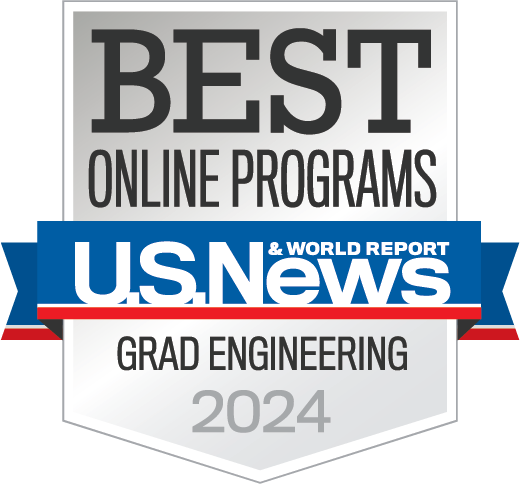100% Online
Complete your Penn State course work at your own pace and 100% online.
Application deadline
Credits and costs
Nationally Recognized

Broaden Your Skills with a Systems Engineering Degree
Develop heterogeneous engineered solutions to complex problems using contemporary methods, processes, and tools.
Analyze the associated tradespaces that system interdependencies generate to identify optimal solution alternatives.
Use integrated models and simulations for multi-level system analysis and practices.
Manage the budgets and schedules of large-scale projects and programs while working effectively and collaboratively within interdisciplinary teams.
Your Systems Engineering Online Courses
Your Systems Engineering Online Courses
The systems engineering program consists of 12 core courses taken over six continuous semesters, with each semester containing two 7-week terms. You can also select courses recognized as equivalent to the INCOSE certification knowledge exam and give yourself a competitive edge. You will study identification, modeling, analysis, architecture, integration, and risk management of complex systems and processes.
You can earn up to four related graduate certificates along the way to your Master of Engineering in Systems Engineering. Students who plan to take the stackable credentials pathway to this degree should follow the course lists for each graduate certificate program. To earn each certificate, you must apply, gain acceptance to the program, and complete the required courses.
- Life-Cycle System Design (9 credits)
- System Quality & Risk Evaluation (9 credits)
- System Modeling and Analysis (9 credits)
- Technical Management (9 credits)
Students who are not pursuing stackable credentials can follow the full course list for the program.
Cohort and Course Sequence
The online systems engineering program is completed in 2 years by taking courses in the fall, spring, and summer semesters. An example of the sequence of courses is below. The sequence in which you take your courses will vary depending on the cohort/class to which you are assigned. You will be notified of your cohort and sequence after acceptance to the program. The sequence in which you will complete the 12 required courses (36 credits) satisfies all the prerequisites for the degree program.
Required Courses (36 credits)
Year 1, Semester 1
- 3credits
Fundamentals of systems engineering with focus on System methodology, design, and management; includes life cycle analysis, human factors, maintainability, serviceability/reliability.
- 3credits
Foundations of individual problem solving including creativity, cognitive style and level, problem solving processes and techniques, the paradox of structure.
Year 1, Semester 2
- 3credits
Study of project management as it relates to engineering and high-technology projects and personnel. Techniques and methodologies to eliminate, mitigate, and manage the risks that threaten project success are covered.
- 3credits
In this course we examine the use of discrete-time approaches to these integrated models and their application to systems engineering. The students also gain hands-on experience on additional topics such as simulation-based optimization by using a commercial simulation software package.
Year 1, Semester 3
- 3credits
The theory and practice of verification, validation and testing of engineering systems.
- 3credits
The theory and practice of systems thinking. General systems theory; system dynamics; emergent properties; structure; feedback and leverage.
Year 2, Semester 4
- 3credits
This course addresses system dynamics modeling and simulation for the analysis of complex systems. Students are exposed to the techniques used to form models of supply-demand, mechanical, electrical, biological, and hybrid systems.
- 3credits
Examines the analysis of decisions under uncertainty within the context of engineering and technology. Evaluation methods; problem identification, modeling, and resolution; consequences/outcomes of the action taken; and risk analysis and quantification are covered to improve the decision-making process of individuals and groups in technical organizations.
Year 2, Semester 5
- 3credits
This course focuses on the creative design process which leads to the development of new products, processes, and systems (i.e. invention).
- 3credits
Theory and applications of requirements elicitation, analysis, modeling, validation, testing, and writing for hardware and software systems.
Year 2, Semester 6
- 3credits
This course covers the fundamental concepts, techniques, and methods for creating and analyzing system architecture of complex systems.
- 3credits
Supervised student activities on research projects identified on an individual or small-group basis.
Course Availability
If you're ready to see when your courses will be offered, visit our public LionPATH course search (opens in new window) to start planning ahead.
Advance Your Career

Advance Your Career
You can use the knowledge gained from this program and the support of Penn State career resources to pursue careers in a variety of fields, depending on your goals.
Job Titles Related to This Degree
Graduates have become systems engineers, lead engineers, principal engineers, engineering managers, and project managers in fields such as aerospace and aviation, government and defense, and manufacturing.
The following roles are often held by people with this type of degree:
- Computer Systems Analyst
- Human Factors Engineer
- Information Systems Analyst (ISA)
- Operations Engineer
- Process Engineer
- Process Improvement Engineer
- Quality Engineer
- System Architect
- Systems Analyst
- Systems Engineer
Employment Outlook for Occupational Fields Related to This Degree
Estimates of employment growth and total employment are provided by the U.S. Bureau of Labor Statistics and are subject to change. While these occupations are often pursued by graduates with this degree, individual outcomes may vary depending on a variety of factors. Penn State World Campus cannot guarantee employment in a given occupation.
Computer Systems Analysts
Computer Occupations, All Other
Software Quality Assurance Analysts and Testers
Industrial Engineers
Career Services to Set You Up for Success

From the day you're accepted as a student, you can access resources and tools provided by Penn State World Campus Career Services to further your career. These resources are beneficial whether you're searching for a job or advancing in an established career.
- Opportunities to connect with employers
- Career counselor/coach support
- Occupation and salary information
- Internships
- Graduate school resources
Ready to Learn More?
Get the resources you need to make informed decisions about your education. Request information on this program and other programs of interest by completing this form.
Ready to take the next step toward your Penn State master's degree?
Costs and Financial Aid
Costs and Financial Aid
Learn about this program's tuition, fees, scholarship opportunities, grants, payment options, and military benefits.
Costs and Financial Aid
Graduate Tuition
Graduate tuition is calculated based on the number of credits for which you register. Tuition is due shortly after each semester begins and rates are assessed every semester of enrollment.
2024–25 Academic Year Rates
| How many credits do you plan to take per semester? | Cost |
|---|---|
| 11 or fewer | $1,027 per credit |
| 12 or more | $12,325 per semester |
2025–26 Academic Year Rates
| How many credits do you plan to take per semester? | Cost |
|---|---|
| 11 or fewer | $1,037 per credit |
| 12 or more | $12,448 per semester |
Financial Aid and Military Benefits
Some students may qualify for financial aid. Take the time to research financial aid, scholarships, and payment options as you prepare to apply. Federal financial aid may only be used to pay for credits used to satisfy program requirements.
Military service members, veterans, and their spouses or dependents should explore these potential military education benefits and financial aid opportunities, as well.
Additional Cost of Attendance Details
To view the detailed list of cost of attendance elements:
- visit the Tuition Information site
- click the plus sign to expand the table
- select a semester from the World Campus row
Technical Requirements
Review the technical requirements for this program.
Note about additional hardware: It is a requirement for this online program that students have ready access to a document scanner that allows for the creation of PDF files, which will enable students to submit handwritten homework and exams in several of the mathematics-based courses.
Earn Stackable Credentials on the Way to Your Degree

Earn Stackable Credentials on the Way to Your Degree
Earn graduate certificates while you work toward your degree. It’s a great way to quickly gain new skills and add valuable credentials to your résumé — without any additional course work, course fees, or application fees.
Finish the following four certificate requirements and the 3-credit capstone course, and you will have completed the requirements to earn your systems engineering master's degree. Please note you must apply and be accepted to each program on an individual basis, but you will not be charged application fees for any program beyond the first.
Complete All of These Certificates (33 credits)
This 9-credit online engineering certificate focuses on skills needed to excel at design thinking, requirements engineering, and systems architecture. It can help you prepare for a variety of careers related to the engineering and development of new products, processes, and systems.
Learn more about the Graduate Certificate in Life-Cycle System DesignThis 9-credit online engineering certificate focuses on systems analysis and the skills needed to model, design, and build complex systems and products in a variety of businesses. The certificate can help you prepare for a variety of systems engineering careers.
Learn more about the Graduate Certificate in System Modeling and AnalysisThis 9-credit online engineering certificate focuses on quality management, decision analysis, and risk evaluation for complex engineering systems and problems. The certificate program can help you prepare for a variety of quality engineering careers as well as analyst careers.
Learn more about the Graduate Certificate in System Quality & Risk EvaluationThis 9-credit online engineering certificate focuses on technology management, leadership skills, and problem-solving. The certificate can help you prepare for a leadership position in engineering and technology fields.
Learn more about the Graduate Certificate in Technical ManagementComplete the Capstone Course (3 credits)
After the certificate requirements have been met, you just need to complete the 3-credit capstone course to finish the master's.
Build Your Professional Network
Your fellow students in the systems engineering program will have undergraduate degrees in engineering, computer science, physics, mathematics, and information technology. Most of the students will be professional engineers and come from the various disciplines of the field.
Complete Your Degree in Two Years

Complete Your Degree in Two Years
Students in this cohort-based program will work closely with a group of peers to complete all course requirements within two years.
This degree consists of 12 courses, which you will complete in continuous seven-week terms over a two-year period. Your course work is designed so that working professionals can continue to work full-time while earning their master's degrees. Maximum flexibility is maintained by the online master’s degree program in an effort to meet both the professional and personal needs of individual students and academic quality standards.
Convenient Online Format
This program's convenient online format gives you the flexibility you need to study around your busy schedule. You can skip the lengthy commute without sacrificing the quality of your education and prepare yourself for more rewarding career opportunities without leaving your home.
A Trusted Leader in Online Education

Penn State has a history of more than 100 years of distance education, and World Campus has been a leader in online learning for more than two decades. Our online learning environment offers the same quality education that our students experience on campus.
Information for Military and Veterans

Are you a member of the military, a veteran, or a military spouse? Please visit our military website for additional information regarding financial aid, transfer credits, and application instructions.
How to Apply to Penn State

How to Apply to Penn State
Apply by April 15 to start May 19
Application Instructions
Deadlines and Important Dates
Complete your application and submit all required materials by the appropriate deadline. Your deadline will depend on the semester you plan to start your courses.
Summer Deadline
Apply by April 15 to start May 19Fall Deadline
Apply by July 15 to start August 25Spring Deadline
Apply by November 15, 2025, to start January 12, 2026
Steps to Apply
For admission to the J. Jeffrey and Ann Marie Fox Graduate School, an applicant must hold either (1) a baccalaureate degree from a regionally accredited U.S. institution or (2) a tertiary (postsecondary) degree that is deemed comparable to a four-year bachelor's degree from a regionally accredited U.S. institution. This degree must be from an officially recognized degree-granting institution in the country in which it operates.
The program contains a number of courses requiring a solid background in mathematics, typically found in an undergraduate program in engineering, physics, chemistry, mathematics, or computer science, with at least two semesters of calculus. Students with other undergraduate majors with a strong background in mathematics may apply. The admissions committee will consider the academic background, as evidenced by the transcript, as part of the overall application.
All applicants are expected to have earned a junior/senior grade-point average of 3.0 or higher.
You will need to upload the following items as part of your application:
Official transcripts from each institution attended, regardless of the number of credits or semesters completed. Transcripts not in English must be accompanied by a certified translation. If you are a Penn State alum, you do not need to request transcripts for credits earned at Penn State but must list Penn State as part of your academic history.
Test Scores — GRE/GMAT scores are not required and will not be reviewed.
English Proficiency — The language of instruction at Penn State is English. With some exceptions, international applicants must take and submit scores for the Test of English as a Foreign Language (TOEFL) or International English Language Testing System (IELTS). Minimum test scores and exceptions are found in the English Proficiency section on the Fox Graduate School's "Requirements for Graduate Admission" page. Visit the TOEFL website for testing information. Penn State's institutional code is 2660.
References (2) — You will need to initiate the process through the online application by entering the names, email addresses, and mailing addresses of the two references. Upon submission of your application, an email will be sent to the recommender requesting they complete a brief online recommendation regarding your commitment for success in an online program. Please inform the recommender they must submit the form in order for your application to be complete.
Program-Specific Questions/Materials
Résumé — Upload a one- to two-page résumé highlighting your full-time employment and/or military experience to the online application.
One-page statement of intent — Outline personal career goals and reasons for wanting to enroll in the program. This statement should be specific and include information about short- and long-term goals and how enrolling in the program may help achieve them. The statement of intent also offers applicants the opportunity to demonstrate writing and communication skills, specify examples of leadership, and provide pertinent information that will assist the committee in selecting candidates who can benefit from and contribute to the systems engineering program.
To begin the online application, you will need a Penn State account.
Create a New Penn State Account
If you have any problems during this process, contact an admissions counselor at [email protected].
Please note: Former Penn State students may not need to complete the admissions application or create a new Penn State account. Please visit our Returning Students page for instructions.
Stackable Credentials Application Fee Waiver
If you have been previously accepted to a program with stackable credentials, you will not be charged an additional application fee for any associated programs.
Associated programs in the systems engineering stack:
Degree
- Master of Engineering in Systems Engineering
Certificates
- Graduate Certificate in Life-Cycle System Design
- Graduate Certificate in System Modeling and Analysis
- Graduate Certificate in System Quality & Risk Evaluation
- Graduate Certificate in Technical Management
If you begin with a certificate and are interested in pursuing the Master of Engineering in Systems Engineering, work with your adviser while completing your first certificate to determine which program to apply to next.
Up to 15 credits earned in any of these certificate programs may be transferred to the master's degree in systems engineering, subject to restrictions outlined in GCAC-309 Transfer Credit.
You can begin your online application at any time. Your progress within the online application system will be saved as you go, allowing you to return at any point as you gather additional information and required materials.
- Choose Enrollment Type: "Degree Admission"
- Choose "WORLD CAMPUS" as the campus
Checking Your Status
You can check the status of your application by using the same login information established for the online application form.6. Complete the application.
Admissions Help
If you have questions about the admissions process, contact an admissions counselor at [email protected].
Contact Us

Contact Us
Have questions or want more information? We're happy to talk.
To learn more about the Master of Engineering in Systems Engineering, please contact:
For general questions about the program:
Dr. Amanda Neill
[email protected]
For general questions about Penn State World Campus:
World Campus Admissions Counselors
Phone: 814-863-5386
[email protected]
Learn from the Best
Learn from the Best
The Master of Engineering in Systems Engineering is offered in partnership with the Penn State Great Valley School of Graduate Professional Studies.
Faculty
Mohamad Darayi
- DegreePh.D., Industrial and Systems Engineering, University of Oklahoma
- DegreeM.S., Industrial Engineering, Tarbiat Modares University
- DegreeB.S., Industrial Engineering, University of Tabriz
Dr. Mohamad Darayi, assistant professor of systems engineering, focuses his principal research and key publications on infrastructure network resilience and simulation modeling applications in health care, manufacturing, and supply chain management. He teaches courses in system simulation, risk analysis, network modeling, and data analytics.
Joanna F. DeFranco
- DegreePh.D., Computer and Information Science, New Jersey Institute of Technology
- DegreeM.S., Computer Engineering, Villanova University
- DegreeB.S., Electrical Engineering and Math, Penn State
Dr. Joanna F. DeFranco is an assistant professor of software engineering. She has worked as an electronics engineer for the Navy and as a software engineer at Motorola. Her research interests include software engineering teams, effective teamwork, Internet of Things, and software-intensive critical systems.
Nil Ergin
- DegreePh.D., Systems Engineering, Missouri University of Science and Technology
- DegreeM.S., Engineering Management, Missouri University of Science and Technology
- DegreeB.S., Environmental Engineering, Istanbul Technical University
Dr. Nil Ergin, associate professor of systems engineering, researches system of systems engineering, complex adaptive systems, model-based systems engineering, and multi-agent systems. Dr. Ergin is also affiliated with the Systems Engineering Research Center (SERC), a DoD–funded University Affiliated Research Center, where she works on collaborative research efforts among multiple universities. She is a member of IEEE and INCOSE.
Kathryn Jablokow
- DegreePh.D., Electrical Engineering, Ohio State University
- DegreeM.S., Electrical Engineering, Ohio State University
- DegreeB.S., Electrical Engineering, Ohio State University
Dr. Kathryn Jablokow is a professor of engineering design and mechanical engineering. She is an experienced researcher, with special expertise in design cognition, engineering creativity, and high-performance design teams. She is also an award-winning educator who has developed multiple engineering courses related to problem solving, creativity, and invention, including a massive open online course that has attracted more than 250,000 learners since 2013. She investigates the human side of engineering and the effects that individual cognitive differences have on the processes and products of design.
Mohamad Kassab
- DegreePh.D., Computer Science, Concordia University
- DegreeM.S., Computer Science, Concordia University
- DegreeB.S., Computer Science, University of Windsor
- DegreeB. Eng., Computer Engineering, Lebanese American University
Dr. Mohamad Kassab is an assistant professor of software engineering. His research includes requirements engineering, software architecture, software quality, software measurements, and the Internet of Things. He has published extensively in software engineering books and journals. With more than 17 years of industrial experiences, he also worked in different industrial roles. Dr. Kassab teaches courses in requirements engineering, software testing, and software architecture and design.
Phillip A. Laplante
- DegreePh.D., Computer Science, Stevens Institute of Technology
- DegreeM.B.A., University of Colorado
- DegreeM.Eng., Electrical Engineering, Stevens Institute of Technology
- DegreeB.S., Systems Planning and Management, Stevens Institute of Technology
Dr. Phillip A. Laplante is a professor of software and systems engineering. He has an extensive list of publications and deep practical experience in requirements engineering, development, testing, and project management for a variety of complex systems, including safety critical and embedded ones. He is widely recognized for work in real-time systems, real-time imaging, and applications in the Internet of Things. He is also a pioneer in licensing of software engineers, having led the development and acceptance of the first licensure exam for software engineers in the United States.
Ashkan Negahban
- DegreePh.D., Industrial and Systems Engineering, Auburn University
- DegreeM.E., Industrial and Systems Engineering, Auburn University
- DegreeB.S., Industrial and Systems Engineering, University of Tehran
Dr. Ashkan Negahban is an associate professor of engineering management. Prior to joining Penn State, he was an instructor at Auburn University, where he taught courses in simulation, probability theory, and statistics. His research interests include the application of different types of simulation (discrete event, agent-based, and Monte Carlo) in design and operation of complex systems. He has developed several e-learning modules that have received worldwide publicity and are used by faculty from leading institutions around the world.
Colin Neill
- DegreePh.D., Software and Systems Engineering, University of Wales Swansea
- DegreeM.Sc., Communications Systems, University of Wales Swansea
- DegreeB.Eng., Electrical Engineering, University of Wales Swansea
Dr. Colin Neill is a professor of software engineering and systems engineering. He teaches many courses in software and systems engineering and project management. He is the author of more than 80 articles on the development and evolution of complex software and systems and their management and governance. Dr. Neill is a senior member of the IEEE and a member of INCOSE, and he serves as associate editor-in-chief of Innovations in Systems and Software Engineering.
Raghvinder S. Sangwan
- DegreePh.D., Computer and Information Sciences, Temple University
- DegreeM.S., Computer Science, West Chester University
- DegreeB.S., Genetics and Plant Breeding, Haryana Agricultural University
Dr. Raghvinder S. Sangwan is a professor of software engineering with expertise in the analysis, design, and development of large-scale, software-intensive systems and the use of AI engineering to design and develop intelligent systems that are safe, secure, and trustworthy. His research focuses on the improvement of these practices, and he has taught related courses to engineers and project managers at many prestigious academic, government, and industry organizations worldwide. Dr. Sangwan actively consults for Siemens Corporate Technology in Princeton, New Jersey, and holds a visiting scientist appointment at the Software Engineering Institute at Carnegie Mellon University in Pittsburgh, Pennsylvania. He is a distinguished contributor and senior member of IEEE and a senior member of ACM.
Kailasam Satyamurthy
- DegreePh.D., Engineering Mechanics, Clemson University
- DegreeM.S., Civil Engineering, Clemson University
- DegreeMBA, Penn State
- DegreeB.S., Civil Engineering, University of Madras
Dr. Kailasam Satyamurthy, assistant professor of engineering, teaches decision and risk analysis, finance and economics for engineers, statistics, optimization, and continuous improvement courses. He held managerial positions at Vanguard and at GenCorp and conducted extensive research in the finite element modeling of nonlinear mechanical and thermal systems. He has vast experience in Six Sigma quality and continuous improvement, and has trained numerous professionals in manufacturing, transactional, and health care industries.
Doug Schumer
- DegreePh.D., Electrical Systems and Engineering, Rensselaer Polytechnic Institute
- DegreeM.S., Measurement and Control, Carnegie Mellon University
- DegreeB.S., Physics, Carnegie Mellon University
Dr. Doug Schumer is assistant professor of engineering design and faculty director of the REV-UP Center for Entrepreneurship. Following 20 years in industry leading medical device R&D, Dr. Schumer held the position of Rensselaer Polytechnic Institute's professor of practice in biomedical engineering and served as Georgia Tech's first director of design innovation and education. He is a member of the New York Academy of Sciences and the American Physical Society.
News


